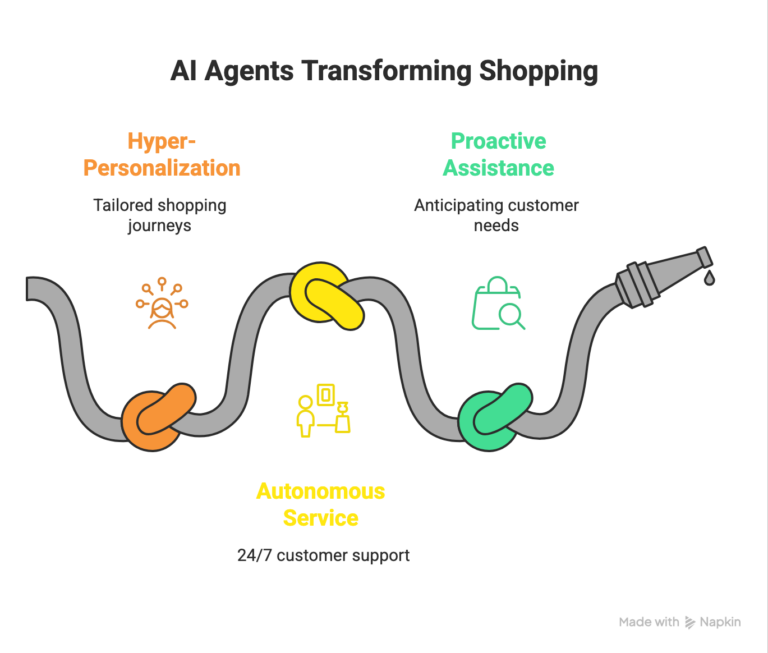Greetings! I'm Aneesh Sreedharan, CEO of 2Hats Logic Solutions. At 2Hats Logic Solutions, we are dedicated to providing technical expertise and resolving your concerns in the world of technology. Our blog page serves as a resource where we share insights and experiences, offering valuable perspectives on your queries.

Quick Summary
AI agents are revolutionizing e-commerce by evolving from simple chatbots into sophisticated autonomous systems that observe, plan, and act independently. They deliver measurable business results, including higher customer satisfaction, increased conversion rates, and a boost in average order values.
As AI agents become more autonomous and collaborative, they’re shifting retail from reactive service models to predictive shopping companions that anticipate customer needs, making them as fundamental to e-commerce as search engines are today.
AI agents are evolving from simple rule-based chatbots into sophisticated, autonomous systems that think, learn, and act on behalf of both businesses and consumers. The global AI agents market, valued at $5.43 billion in 2024, is projected to reach an unprecedented $236.03 billion by 2034, with a staggering CAGR of 45.82%. This explosive growth reflects the fundamental shift occurring in how we shop, sell, and interact in the digital marketplace.
Understanding AI Agents
The gap between traditional chatbots and AI agents is vast. While chatbots follow scripts, AI agents think, learn, and act independently. They don’t just respond, they observe, plan, and execute strategies autonomously. This fundamental difference is reshaping how businesses approach customer engagement and e-commerce automation.
Autonomous Intelligence Systems
AI agents are far more sophisticated than traditional chatbots or recommendation engines. They possess the ability to observe their environment, make strategic decisions, and take autonomous actions to achieve specific goals. AI agents utilize advanced technologies, including machine learning, natural language processing, and generative AI, to exhibit human-like reasoning capabilities.
These intelligent systems demonstrate three core capabilities that distinguish them from simpler automated tools:
- They can observe their environment by continuously analyzing data from multiple sources
- Plan their actions using sophisticated algorithms, and
- Act autonomously to accomplish objectives with minimal human oversight.
This observe-plan-act cycle is self-reinforcing, enabling AI agents to learn and improve their performance over time.
The Shopping Assistant Market Surge
The AI shopping assistant segment specifically is experiencing remarkable growth, with market size expanding from $3.36 billion in 2024 to a projected $28.54 billion by 2033, representing a CAGR of 26.9%.
This growth is driven by consumers’ increasing comfort with AI-powered interactions. 69% of consumers are satisfied with AI-powered product recommendations. In comparison, 61% of US consumers now use general-purpose AI tools like ChatGPT for shopping assistance.
How AI Agents Are Changing the Shopping Experience
AI agents are doing more than improving online shopping; they’re completely reinventing it. By combining deep customer understanding with real-time decision-making capabilities, these systems create shopping experiences that personalize interactions.

Hyper-Personalized Shopping Journeys
AI agents excel at creating deeply personalized experiences. They analyze vast amounts of customer data from multiple sources. This includes browsing patterns, purchase history, and social media activity. They also consider real-time signals like location and time of day.
This personalization meets growing consumer expectations. 91% of shoppers prefer brands that provide relevant offers and recommendations. Meanwhile, 76% become frustrated when websites lack personalization. Modern AI shopping agents understand complex, conversational queries.
For example, a customer might ask, “I need a red dress for a party with a high neckline, mid-length, no sleeves, under $100.” The AI agent processes this natural language request instantly. It analyzes the customer’s preferences and past behavior. Then it provides curated recommendations that feel tailored to individual needs.
24/7 Autonomous Customer Service
Unlike human agents who work within specific hours, AI agents operate continuously, providing instant responses and resolving complex queries. They can handle everything from order tracking and returns processing to product comparisons and purchasing decisions.
Advanced agents even detect emotional cues in customer interactions, knowing when to escalate issues that require human empathy or complex problem-solving.
Proactive Shopping Assistance
Perhaps most remarkably, AI agents are becoming proactive rather than merely reactive. They can anticipate customer needs based on behavioral patterns and automatically reorder frequently purchased items.
They also monitor price drops on wishlisted products and even initiate conversations when they detect shopping intent. This shift from passive response systems to active shopping companions represents a fundamental change in the retail relationship.
Market Impact and Consumer Adoption
People are getting comfortable with AI helping them shop, and it’s changing how we all shop online. The results are encouraging; businesses are discovering that AI agents help them sell more and keep customers happier.
Demographic Trends and Preferences
Consumer acceptance varies significantly across demographic groups.
- Men show 44% interest in AI shopping assistants compared to women
- Millennials lead adoption at 22%, followed by Generation Z and older demographics
- 58% of Millennial consumers express a desire for more personalized product recommendations, while 51% want frictionless payment options enabled by AI.
The trust factor is crucial: currently, 1 in 3 consumers would trust AI to make purchases on their behalf, representing a significant shift in consumer confidence. This trust is built on AI’s proven ability to deliver relevant recommendations; 83% of consumers are likely to purchase from brands that suggest products they recently browsed.
Business Impact and ROI
For retailers, AI agents deliver measurable results across multiple metrics. Businesses implementing AI agents report:
- 25% boost in customer satisfaction and 20% increase in conversion rates
- 15% improvements in productivity for software engineering teams
- Double-digit productivity gains in customer service call handling
- 40% increase in average order values through intelligent upselling
The automation capabilities are particularly impressive; tasks that once required six analysts per week now require just one employee working with an AI agent, delivering results in under an hour.
Technology Architecture and Capabilities
Multi-Modal Intelligence
Modern AI agents leverage multiple AI technologies simultaneously. They use natural language processing to understand conversational queries, computer vision for visual search capabilities, machine learning algorithms for pattern recognition, and predictive analytics for demand forecasting. This multi-modal approach enables them to process text, voice, images, and behavioral data simultaneously to create a comprehensive customer understanding.
Integration Across Channels
AI agents excel at omnichannel integration, maintaining consistent customer experiences across websites, mobile apps, social media platforms, and physical stores. They can remember customer preferences and conversation history across all touchpoints, ensuring transitions between channels. This capability addresses the modern consumer expectation for unified brand experiences; 90% want consistent experiences across all touchpoints.
Real-Time Decision Making
Unlike traditional systems that require batch processing, AI agents make decisions in real-time. They can adjust pricing dynamically based on demand and inventory levels, modify product recommendations based on immediate context changes, and respond to market conditions as they develop. This real-time capability is crucial for competing in today’s fast-paced e-commerce environment.
Content Strategy and SEO Implications
High-Value Keywords and Search Intent
The shift toward AI-powered search is evident in recent data showing significant growth in traffic from generative AI searches to US retail websites. This dramatic change means traditional keyword strategies must evolve to accommodate conversational, question-based queries typical of AI search interactions.
Future Implications and Market Evolution
Autonomous Shopping Ecosystems
The future points toward fully autonomous shopping experiences where AI agents handle entire purchase journeys independently. Recent updates to AI platforms now provide hyper-targeted product recommendations with visual details, pricing, and direct purchase links, without advertisements. This represents a fundamental shift from search-based discovery to AI-curated commerce.
Multi-Agent Collaboration
The next evolution involves multi-agent systems where specialized AI agents collaborate to handle complex retail operations. One agent might specialize in inventory management while another focuses on customer service, with both sharing data and insights to optimize overall performance. This approach promises even greater efficiency and more sophisticated customer experiences.
Ethical Considerations and Trust Building
As AI agents become more autonomous, transparency and ethical considerations become paramount. Businesses must balance the benefits of AI automation with consumer concerns about privacy, data usage, and decision transparency. Successful implementations will prioritize explainable AI, giving customers insight into how recommendations are generated and decisions are made.
Conclusion
The transformation of online shopping through AI agents represents more than technological advancement; it’s a fundamental reimagining of commerce itself. As these systems continue to evolve, they promise to create shopping experiences that are more intuitive, efficient, and personally relevant than ever before. The businesses and consumers who embrace this shift will be best positioned to thrive in the AI-powered future of retail.
FAQ
What are AI agents and how do they differ from chatbots?
AI agents are sophisticated, autonomous systems that can observe, plan, and act independently to achieve specific goals. Unlike traditional chatbots that follow pre-programmed scripts, AI agents use machine learning, natural language processing, and generative AI to think and make decisions like humans. They can learn from interactions and improve their performance over time.
What technologies power modern AI agents?
AI agents combine multiple technologies simultaneously: natural language processing for conversational queries, computer vision for visual search, machine learning for pattern recognition, and predictive analytics for demand forecasting. This multi-modal approach enables comprehensive customer understanding.
Are AI agents replacing human customer service?
AI agents complement rather than completely replace human service. They handle routine queries 24/7 and detect emotional cues to escalate complex issues requiring human empathy. The goal is enhancing efficiency while maintaining the human touch when needed.

Related Articles







